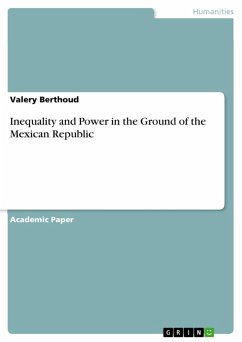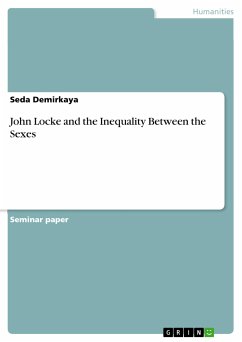Academic Paper from the year 2017 in the subject Philosophy - Miscellaneous, grade: 1,7, Humboldt-University of Berlin, course: Ungleichheit und Macht, language: English, abstract: Many Mexicans accept that life is not fair. A family guy, who lives from hand to mouth, does not care about changing the power structure. He rather thinks: "what do I win by fighting? what would give me the sacrifice? I earn money so that my daughter can go to school, and to buy one kilogram of tortillas." He cannot take a chance. My original question was how Mexicans can tolerate an oligarchy. The answer is we do not want to have conflicts. We rather evade conflicts in exchange of accepting that life is not fair, that we live in a society with enormous moral and political problems such as discrimination and corruption. The brave Mexicans who try to rebel, get killed. In this paper, I deal with recent research about inequality and power. By inequality, I understand that individuals do not have the same opportunities. People are treated badly for all kinds of unfair things: skin color, intellect, finance, ideals, gender, and everything else that makes who they are. To define power is very difficult. Power is a necessary means for the fulfillment of any goal. The more goals you set, the more power you need. Plato's conception is different. In his dialogue, Gorgias, Socrates believes that the tyrants have little power. According to Socrates, someone possesses power if and only if he or she does the good because we do things for the sake of the good. Accordingly, if someone does not do the good, then he or she is powerless. The aim of my work is to extend current knowledge of the power structure of Mexico. If we want to transform our society, we need to understand how it works. Inequality and power are the important issues that need to be studied in order to improve the standard of living of the population. This paper is divided into three parts. The first part gives a brief overview of different approaches explicating inequality and power. Second part describes the case of Mexico. Third part analyzes the relation between the different approaches and the case of Mexico. The first part has eight sections that match with the eight sections of Part III. So Section 2.1 matches with Section 4.1, 2.2 with 4.2, 2.3 with 4.3, and so on, respectively.
Dieser Download kann aus rechtlichen Gründen nur mit Rechnungsadresse in A, B, BG, CY, CZ, D, DK, EW, E, FIN, F, GR, HR, H, IRL, I, LT, L, LR, M, NL, PL, P, R, S, SLO, SK ausgeliefert werden.









